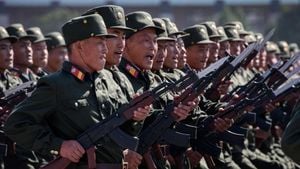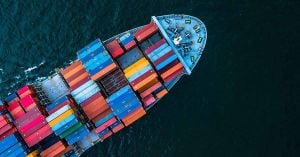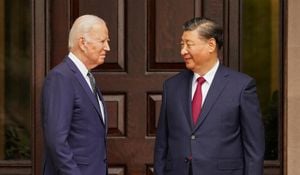Indonesia is gearing up to witness its new president, Prabowo Subianto, making his inaugural foreign trips, starting November 8, 2024. This significant diplomatic venture marks the former defense minister's first major step onto the global stage since he assumed office on October 20, 2024. His travels will span across multiple continents, highlighting Indonesia's intent to reinvigorate its international relations and bolster its presence among global powers.
Prabowo’s initial destination will be China, where he plans to hold discussions with President Xi Jinping. The meeting aims not only to strengthen bilateral ties but also to address mutual concerns and explore avenues of cooperation. This strategic choice reflects the importance of China as one of Indonesia's largest trading partners. During his stay, he will also meet Prime Minister Li Qiang and attend various ceremonial functions, including visiting the Great Wall of China and participating in a state banquet.
Following his engagement with Chinese leadership, Prabowo will jet off to Washington, D.C., for discussions with U.S. President Joe Biden. This meeting is set to cover similar themes of cooperation and mutual welfare, and it marks Indonesia's commitment to maintaining strong ties with the United States, which remains one of its most significant allies.
The president's international itinerary continues to Peru, where he will participate in the Asia-Pacific Economic Cooperation (APEC) Summit on November 14-15, 2024. He is expected to engage with leaders from across the Asia-Pacific region, addressing pressing issues like climate change, trade, and economic recovery following the global pandemic. Before heading to the summit, Prabowo will meet with Peruvian President Dina Boluarte to discuss bilateral matters.
Apostrophizing his busy schedule, Prabowo will then progress to Brazil to partake in the G20 Summit on November 18-19. This forum gathers the leaders of the world’s largest economies, providing substantial opportunities for Indonesia to advocate for issues close to its national interests, such as sustainable development and economic resilience.
Adding to his already ambitious itinerary, rumors suggest he may visit the United Kingdom. This potential stop could see him engaging with British Prime Minister Keir Starmer and possibly meeting King Charles, where discussions on trade and defense cooperation might take place. There have even been hints of a royal tea reception hosted for the Indonesian president at Buckingham Palace. Such engagements paint a picture of Indonesia’s aspirations to establish stronger ties with traditional powers.
Domestically, Vice President Gibran Rakabuming Raka is slated to assume presidential duties during Prabowo's travels, ensuring continuity of governance. Gibran is expected to take on responsibilities aiming to gain international exposure, though he will be advised closely during these ventures to manage the intricacies of diplomatic engagements effectively.
This whirlwind of diplomatic activity is rooted deeply within the larger narrative of Indonesia's foreign policy transformation under Prabowo. Since taking office, he has signaled intentions to employ Indonesia’s traditionally non-aligned approach as his administration’s blueprint for international relations. Still, Prabowo emphasizes the need for Indonesia to be active globally, carving out its path without entangling itself too deeply within military alliances.
The significance of Prabowo’s foreign trips extends beyond mere diplomacy. They symbolize Indonesia’s ambition to reclaim its image on the world stage after years of fluctuated visibility and attendance at major global forums. Recognizing Southeast Asian and other regional affiliations, his administration is mindful of ASEAN’s pivotal role. Many ASEAN leaders attended his inauguration, affirming the collective importance of these alliances.1
Indeed, during his inauguration, the presence of 19 heads of state and 19 heads of government from various nations underscored the regional weight Indonesia carries. The inclusion of top leaders from East Asia, such as South Korean Prime Minister Han Duck-soo, demonstrates the shared commitment to enhancing Indonesia's economic and diplomatic foothold.
Yet, as Prabowo embarks on this international tour, commentators remind him to maintain focus on nurturing regional relationships, particularly with ASEAN and Pacific nations. Notably, his foreign trips come at a time when geopolitical tensions, especially concerning the South China Sea and North Korea, pose challenges requiring diplomatic finesse. Establishing stable connections with neighboring countries and regional partners is as pivotal as addressing broader issues affecting the global audience.
Prabowo’s ambitious agenda can be seen as both opportunistic and reflective. His administration must balance engagement with great powers and nurturing regional cooperation to amplify Indonesia’s role as not only participant but also shaper within global discussions.
To sum up, Prabowo Subianto’s first official foreign visits represent Indonesia's broader commitment to reasserting its presence and partnerships worldwide. With strategic meetings lined up across diverse regions, these engagements will test the new government's diplomatic mettle and its dedication to fostering strengthening Indonesia's international relations network. With high expectations resting on his shoulders, all eyes will undoubtedly be on the outcomes from these pivotal meetings.



